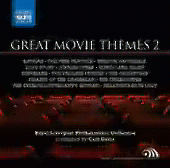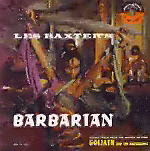Great Movie Themes 2/Compilation of Film Composers
May 27, 2009
 Naxos has just introduced “Great Movie Themes 2” as the second installment from Carl Davis conducting the Royal Liverpool Philharmonic Orchestra. He makes available movie themes in easy listening arrangements, appealing to a wider listening audience at an affordable price. In terms of audience appeal film music compilations, in some respects, are a no win situation for the record producer. Silva, who I’ve given the title of “King of the Compilations,” is always recycling material under different titles. The latest compilation offered Batman material, some of which had been released under a previous Tim Burton movie compilation. They try to save money. How many will say “Been there, done that already.” Some will question including choices such as “Deerhunter,” “The French Lieutenant’s Woman,” or two selections from “Superman” and omitting x, y, and z. Why are there 6 selections of John Williams’s material in the first two volumes and nothing from Thomas Newman? I’m glad that I don’t have the tough decisions to make as to what to include. One thing for sure is that the choices and styles of music are varied.
Naxos has just introduced “Great Movie Themes 2” as the second installment from Carl Davis conducting the Royal Liverpool Philharmonic Orchestra. He makes available movie themes in easy listening arrangements, appealing to a wider listening audience at an affordable price. In terms of audience appeal film music compilations, in some respects, are a no win situation for the record producer. Silva, who I’ve given the title of “King of the Compilations,” is always recycling material under different titles. The latest compilation offered Batman material, some of which had been released under a previous Tim Burton movie compilation. They try to save money. How many will say “Been there, done that already.” Some will question including choices such as “Deerhunter,” “The French Lieutenant’s Woman,” or two selections from “Superman” and omitting x, y, and z. Why are there 6 selections of John Williams’s material in the first two volumes and nothing from Thomas Newman? I’m glad that I don’t have the tough decisions to make as to what to include. One thing for sure is that the choices and styles of music are varied.
The “Pink Panther” is one of the more recognizable themes and Brian Gascoigne arranged it a little more on easy swing side as opposed to the raucous version Mancini arranged for concert orchestra. I’ve heard the Boston Pops perform this classic many times and it is quite the vibrant piece. The suite from “Mission Impossible” is nice as the 5 minutes consist of the two main themes from the highly successful television series intermixed as they are performed. Again, the arrangement by Mike Townend is more on the conservative side. The three choices of John William’s material from “Jurassic Park” and “Superman” are some of the more memorable themes John has written. I’m partial to the “Can You Read My Mind?” selection as I used to play this for my daughter daily for at least a year. If you enjoy schmaltz, the arrangements of “Love Story”, “Romeo and Juliet”, “English Patient”, and “Godfather” will be to your liking. They are arranged and performed to bring a tear to the dry eye. “Pirates of the Caribbean” is really lacking in the vibrancy necessary to truly capture this Klaus Badelt composition which is a loud rocking chanty.
The highlight for this reviewer was in the wonderful Christopher Palmer arrangement of the Stanley Myers Intro and Cavatina from “The Deerhunter.” The lonely distant trumpet, minor chords from the lower register strings, and then the beginning of that beautiful theme from the flutes and horns result in one of the prettiest themes ever written for the silver screen. The other interesting track of merit is the fine composition from Carl Davis for “The French Lieutenant’s Woman.” It’s not a great melody but the overall track is conveying the yearning love in a recital style. Well done!
For the casual listener to film music this CD would be a perfect addition to your collection. Nice conservative arrangements of classic melodies for the silver screen. The hard core collector would have to decide if “The Deerhunter” and French Lieutenant’s Woman” would warrant an $8.00 investment. Those two cues are awfully good but the rest is as I stated earlier “Been there, done that.”
Naxos CD# is 8.572111
Producer and Editor: Andrew Walton
Track Listing:
1.… Batman Theme (Elfman) 2:18
2.… The Pink Panther (Mancini) 3:54
3.… Mission Impossible Suite (Schifrin) 4:55
4.… Theme from Love Story (Lai) 4:35
5.… Theme from Jurassic Park (Williams) 5:40
6.… Romeo and Juliet (Rota) 3:40
7.… March From Superman (Williams) 4:18
8.… The English Patient (Yared) 5:41
9.… The Godfather (Rota) 4:00
10.. Love Theme from Superman (Williams) 5:06
11.. Pirates of the Caribbean (Badelt) 5:32
12.. Introduction and Cavatina from The Deerhunter 6:56
13.. The French Lieutenant’s Woman (Davis) 4:28
14.. Shakespeare in Love (Warbeck) 6:44
Total Time is 68:44
Sirens/Gliere
May 17, 2009
 Writing in the early to mid 20th Century, Reinhold learned his craft well from Arensky and Ippolitov-Ivanov, creating wonderful harmony and orchestrating. His work was praised in 1948 as continuing the Russian romantic tradition from the government, while Shostakovich, Myaskovsky, and Prokofiev were condemned for their work, thus an overwhelming acceptance from Stalin, something difficult to obtain.
Writing in the early to mid 20th Century, Reinhold learned his craft well from Arensky and Ippolitov-Ivanov, creating wonderful harmony and orchestrating. His work was praised in 1948 as continuing the Russian romantic tradition from the government, while Shostakovich, Myaskovsky, and Prokofiev were condemned for their work, thus an overwhelming acceptance from Stalin, something difficult to obtain.
Written in 1908, the same year as his second symphony a busy composing time for Gliere, the symphonic poem uses the “Sirens” from Greek mythology as the basis for his composition. Sailors would hear the magic music from the “Sirens” and their ship would be lured to the island where it would crash and sink on the hidden rocks. Both Odysseus and Orpheus used various methods to prevent themselves and their sailors from hearing the magic songs. The single 13+ minute work is divided into 5 sections as noted by the composer put performed without pause.
1…The Sea
2…The Isle of the Sirens
3…Approach of the Vessel
4…The Song of the Sirens
5…The Shipwreck
The work begins with an ominous statement in a minor key with rumbling from the kettledrum and basses in the background, yet another interesting interpretation of the expansive ever-moving ocean from a composer. It leads into a happier flighty section; a land of enchantment and peace or so thinks the sailors and the listener. The calling of the brass, with the magical melody from the “Sirens” supported by harp, flute, and celesta lead the music into a jagged yearning climax of doom, a motif very similar in nature to a passage from Gliere’s epic Third Symphony ’Ilya Murometz.’ It comes to a conclusion in a ppp with only the lower register of the orchestra.
This certainly must take its place with the likes of “Isle of the Dead,” “The Sea,” “The Island,” and other works about the body of water that encompasses over ½ the earth. To my knowledge it is the only available recording on the market although there has been a Melodiya recording (M10 39547) long out of print. The people at Naxos, in my opinion, have been able to find and make available a lot of obscure material that is quality composing, worthy of recording. While I have no other recording to compare it to I found it to be well performed and recorded. It is coupled with his 1st Symphony, a very early work that will be reviewed separately. We can assuredly put this in the category of classical recordings you don’t have but should. Recommended.
Total Time is 13:34
Performed by the Slovak Philharmonic Orchestra conducted by Stephen Gunzenhauser.
Naxos CD# 8.550898

Les Baxter is certainly not a common known name to the younger soundtrack collector. Les in the music world was primarily known for his “exotica” music, billboard hits of his arrangements of Poor People of Paris and Quiet Village in the 50’s, his arranging and musical directing for Capitol records, and his work as a composer for AIP which included Roger Corman horror pictures, bikini beach blanket films, and any drive-in movie theme sure to attract the teenage crowd. While his name appears in the credits for over a 100 films few have reached CD releases or MP3 downloads. Intrada (ISE1029) has made available in a 2 CD limited edition release Master of the World (1961), and Goliath And The Barbarians (1959) both previously released on LP. In addition, OST recorded material from Master of the World was located and included for this release including two vocal numbers of the main title not included in the Vee Jay LP (SR 4000) of 1961 or the film. Called Come Dance With Me (nothing to do with the Sinatra classic except the name) it was a catchy lyric sung in both choral and male vocal arrangements. I can remember purchasing the LP in a mono format from a bargain cut-out bin for the ridiculous price of 3 for a $1.00 Apparently the soundtrack had about the same amount of appeal as the film.
Master of the World used Richard Matheson as a writer and he combined two of Jules Verne novels Robur the Conqueror and Master of the World to tell his story of Robur and his goal to end war in the world at any cost with his somewhat unusual craft which could fly, travel over or under the water and even perform as an automobile. Vincent Price, Charles Bronson, and Henry Hull starred in the William Witney directed film, which offered stereo sonic (?) sound and magna color (?). I noticed nothing special in the color and I certainly didn’t get the idea that this was a 100-piece orchestra, which it inferred. The name of the group could have been the “100 Men” and in reality been a 40-piece group, which is what it sounded like. No matter; it is really nice material from Les Baxter. “Overture” gives us both the main theme and the beautiful waltz, both of which are used throughout the 31+ minute score. If you like schmaltzy music sometimes, and this reviewer does, “Balloon Waltz” is a perfect example with piano and strings in just the right combination. “Master of the World” is another example of pure elevator music again using the piano and strings with the main theme from the film. “Topage” is a whimsical piece offering a little bit of a travelogue with lots of brass and percussion. “Mediterranean” is the romantic interlude music you would experience at an Italian café with a loved one. “Drifting Clouds” is another nice version of the waltz theme with full orchestral treatment giving a dose of brass and nice work from the harp in harmony. If you own this CD there is a slight drop in the left channel that lasts for a second or so, something on the master as both my LP and CD are identical. You’ll also find that the sound of the new material from the film has cleaner crisper sound with fuller dynamic range. The transfer from the LP is a bit flat at times, lacking punch.
Goliath and the Barbarians (1959) was the first in a series of Goliath vs. something from Italy. Fresh from his huge success with Hercules, Steve Reeves starred and the film was marketed in the U.S. by AIP. The original score by Carlo Innocenzi (available on Digitmovies CDDM 113) was replaced by a Les Baxter one, which was originally released by American International on LP. The design of the cover made it look like one of his Capitol ‘exotica’ releases and perhaps helped in the sale of it. The Intrada recording is a remastering and contains the same material as the LP releases. “Goliath’s March,” the main theme, is a typical one a marching band could play; a nice melodic song. “Landa,” the love theme, also repeated with more of a modern flare in “Love’s Farewell,” is a mysterious Middle Eastern one straight out of a Rimsky-Korsakov opera. There is a small blip in a transitional moment at 1:15 on the track. If you’re familiar with the music of Baxter you’ll hear the opening motif of The Pharaoh’s Curse starting the “Barbarian Games,” gladiator type music in the tradition of Rozsa. “Rape of the Village,” and “Fire Dance” is also tracks that you’d expect to hear from a period film such as this one with the difference being the playing of the London Sinfonia.
This release sold out in a relatively short period of time. As a result the speculating on E-Bay is demanding a high price, at least at the time of this writing, and frankly this material isn’t worth the amount of money they’re asking. It is nice material but nothing special. Wait and look for it in the $25.00 price range or as a possible second pressing in the future.
Track listing
Disc/Cassette 1
1. Main Title And Dreams Of Flight (02:24)
2. Topage (01:53)
3. Betrayed And Discipline (04:20)
4. Flight Concerto (02:18)
5. The Mountains (05:07)
6. End Title (01:44)
7. Come Dance With Me [Exit Music] (02:17)
1-7 suite from the original soundtrack (film versions)
8. Overture (02:21)
9. Topage (01:52)
10. The Albatross (02:22)
11. Mediterranean (02:50)
12. Over The Rocks (04:39)
13. Master Of The World (01:45)
14. Flight Concert (02:16)
15. Philadelphia (01:59)
16. Drifting Clouds (03:11)
17. The Conquerors (04:26)
18. Balloon Waltz (02:18)
19. Finale (01:47)
8-19 original 1961 re-recorded album
CD1: MASTER OF THE WORLD (1961) total time 53’16
Disc/Cassette 2
1. (Main Title) Goliath’s March (00:55)
2. (Love Theme) Landa (01:51)
3. (Noisy Village) Barbarian Games (03:02)
4. The Sacred Crown (04:22)
5. Sword Dance (03:24)
6. Mountains Of Mystery (05:00)
7. Ride Of The Barbarians (01:44)
8. Night Attack Of The Stranger (02:58)
9. Love’s Farewell (02:37)
10. Rape Of The Village (02:27)
11. Fire Dance (02:50)
12. (End Title) March Of Victory (02:52)
CD2: GOLIATH AND THE BARBARIANS (1959) total time 34’53
Total Duration: 01:25:51
CD# Intrada ISE 1029
Master of the World performed by the 100 Men conducted by Cal Carter
Goliath and the Barbarians performed by the London Sinfonia conducted by Muir Mathieson
Produced by Douglass Fake
“Come Dance With Me” performed by an unknown singer.
